Ken Lizzi's Blog, page 10
January 28, 2024
Kandar. Good Nyborg.

The tastefully named Kenneth Bulmer produced a slim volume of sword-and-sorcery titled Kandar, published in the auspicious year of 1969, my natal year. What to say about this? Let me try a few different approaches.
This is streamlined S&S. The paperback weighs in at 127 pages, yet the narrative covers a lot of ground. Bulmer did that by stripping the story down to its essentials. Elmore Leonard’s advice about leaving out the parts people tend to skip is taken here to its limit. Here’s an example from page 95: “They hacked their way a little distance into the jungle, slashing at trailing lianas and groping half-sentient fronds, avoiding giant flowers that sought for them with blind hungrily sucking cups, until they reached a stream. Here, as night fell with a pandemonium of shrieks and calls from the nighted jungle about them, they set a fire and rested.” That’s it. In the hands of another writer that one paragraph would be two or three pages, perhaps an entire chapter. Come on! Half-sentient fronds, giant flowers hungry for blood. A dark jungle night cacophonous with the cries of unknown beasts. Compelling, intriguing, potentially pulse-pounding. Bulmer gives us one evocative paragraph. But it’s enough, it works. It’s a single panel of a comic book that provides all the reader needs. That’s what Kandar is: the distilled essence of a wild, fantastic S&S romp. It stops short of camp, of the sort of burlesque it might have been had, for example, Lin Carter written it. Though some of the dialogue — particularly that of the barbarian swordsman caricature, Krak — does stray into the territory of parody, e.g., “By the bounteous bottom of sweet Vashitulu the Buxom! If I could but swing Koztivkure at these fiends!”
Kandar ideally ought to be read with an accompanying soundtrack by Don Felder, Sammy Haggar, and Black Sabbath. It should be illustrated by Richard Corben. Kandar is an outtake from Heavy Metal. And that is meant as a compliment. The story starts fast and seldom slows down. Our hero, the eponymous Kandar, undertakes a quest to track down two tomes to complete the Trilogy of the Damned in order to summon beings powerful enough to free his embattled city from temporal stasis and rescue his father the God-Emperor, his brother the prince, and a few others. The story follows the travels and adventures that ensue in pursuit of the quest. Those adventures get pretty far out. This was, after all, written in the ’60s. There is magic, swordplay, and sex.
Did I mention that it is short? This is a book meant to be read after drawing a liter of beer from your kegerator and sitting down in a comfortable chair for a few hours. If your afternoon isn’t interrupted, you should be able to breeze right through it. This isn’t immortal literature. But it is fun. I have quibbles: the bad guys who kick things off are never explained, no backstory or motivation is ever provided. The world building is piecemeal. It’s a D&D home-brew campaign world with 90% of the hexes not filled in, just the few with adventure hooks. It doesn’t matter. The momentum of the story carries you zipping past any of that. By the time you think you’ve spotted a plot hole, you’ve already been rocketed along to another action scene: a shipwreck or a Night on Bald Mountain Walpurgisnacht. So relax, enjoy the ride. It will be over shortly.
Then, if you are hungry for more fantasy adventure, refill that liter beer mug and pick up a copy of Thick As Thieves.
January 21, 2024
Cahena, Manly Wade Wellman’s Heroic Historical Fiction
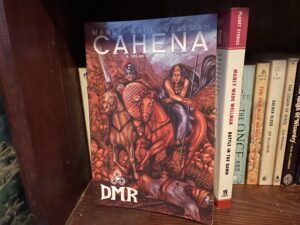
Christmas gifts can extend the season substantially. I received a Christmas present of the DMR edition of Manly Wade Wellman’s novel Cahena: A Dream of the Past. I read it this week, thus drawing my holiday out longer. Well, Merry Christmas to me; what a fine gift.
Manly Wade Wellman was one the last of the pulp authors. He was perhaps best known for his Silver John stories. I particularly enjoyed his Kardios of Atlantis stories, and I like his paranormal detective character John Thunstone. Cahena is a tonally different work. Ostensibly it is a work of historical fiction. When the first suggestions of the supernatural appeared in the narrative, my first instinct was to compare it to John Myers Myers The Harp and the Blade, another work of historical fiction that incorporates just enough hints of the numinous that it was marketed as fantasy. But the supernatural element in Cahena grew more pronounced as the story went along. The disappearance of gods, spirits, and magic became a bit of a plot point. And there is another major divergence between the two works. Myers’ tale is a glittering, witty work full of the joy of living. Wellman could write in a similar vein (c.f. the Kardios stories.) Yet he employed an entirely different approach in Cahena. His style here is spare, almost Hemingway-esque, shorn of adornment.
The style is appropriate. Cahena, you see, is a tragic work. The terse narrative grounds the story in harsh reality. Even the mentions of magical healing, of the sightings of the death god choosing those to be slain, of vampires and fortune telling come across as matter of fact, quotidian. Whereas Harp and Blade is celebratory, Cahena is elegiac, resigned. Its moments of feasting and lovemaking do not revel in life for the sake of life, but rather are moments to be savored because death is always imminent. Everything is a rearguard action. Nothing can be trusted. A lover can be supplanted by another. Treachery is inescapable. The very gods will disappear. Only Death remains.
So, yes, it is grim. But don’t let that put you off. It is good.
The book begins with a framing sequence. The main character, Wulf the Saxon, is brought to the tent of Charles Martel before the Battle of Tours, and tells the tale of the warrior queen, Cahena, with the supposed purpose of providing Charles an idea of how to fight the invading Moslem army. Wulf narrates his experience of twenty or so years before serving as Cahena’s advisor, general, and sometime lover, trying to hold off the Moslem army sweeping through North Africa. It is an engrossing story, filled with architectural, culinary, and cultural detail, exciting battles, friendships, betrayals, and a gradually increasing sense of inevitable loss: Fate, resignation, but never quite despair.
History, drawn out long enough, simply doesn’t provide happy endings. Nonetheless, Cahena is well worth the read. You might also enjoy something of mine. Picking at random from the vanity shelf…Under Strange Suns. Give that one a read, I think you’ll like it.
January 14, 2024
Bard IV. A Bloody Culmination.
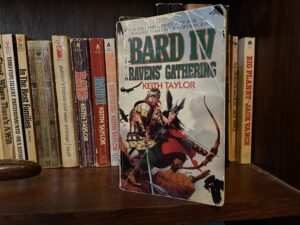
I have been belatedly reading through Keith Taylor’s Bard series. I was going to write “working my way through” but that phrase suggests effort, labor. The Bard books are effortless. Reading them is a joy, not a chore.
Book Four, Ravens Gathering, is, as the title suggests, a story of a convergence, a gathering. Characters, entire armies, are gradually brought into position for a climactic confrontation. The book is a culmination, as characters and storylines from the previous volumes come together for a final resolution. In some ways the eponymous bard, Felimid mac Fal, become merely another point of view character, one among many. This is no longer his story alone, but that of various chieftains from either side of the English channel, and — most notably — Gudrun Blackhair, Felimid’s pirate queen lover.
Given the nature of the book, the plot is less innovative and fantastical than the previous entries. We are, broadly speaking, dealing now with prior acquaintances, not making new ones. But it is nonetheless gripping as, with various false starts, inconclusive engagements, and close shaves, the parties converge on Gudrun’s pirate lair for the final showdown.
There is about this novel (and, perhaps the prior two) a faint echo of Robert E. Howard’s Queen of the Black Coast, his tragic tale of Conan’s romance with Belit. I can only assume that was intentional. It provides an undertone to the narrative hearable only by those familiar with the S&S canon. That’s good writing.
And the end can be perceived as truly the end, a terminal point for the series. It can also be read as a fresh start for Felimid, offering new vistas for both writer and reader.
I found it interesting that this novel offers few entirely sympathetic characters. While that doesn’t make it “grimdark” it does offer a point of similarity with much of contemporary fantasy, with all the characters being bastards possessing morality of varying shades of gray. Here we’re dealing with pirates, pillagers, and sociopaths, whether human, divine, or otherwise. The ending can, from a certain point of view, be seen as a happy one. Consider the point of view of any of the coastal villagers. A reduction in piratical predation could only be considered a boon. And Odin certainly came away pleased with his sanguinary harvest.
But we readers have grown to know these characters. So Bard IV might be more tragic than satisfying to some readers. Who lives, who dies? I’m not telling. You’re favorite pirate might survive or might not. You’ll have to read and find out for yourself. Still, it is a Keith Taylor novel, so you’re in good hands.
Speaking of thieves (pirates are just seaborne thieves, after all), if you like Bard IV, you might also like Thick As Thieves, my crime/S&S novel. Also available here.
January 7, 2024
The Watchers Out of Time. H.P. Lovecraft and August Derleth.
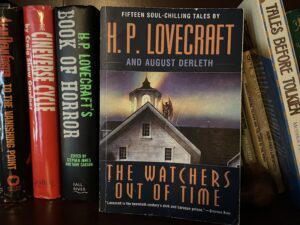
H.P. Lovecraft receives top billing for The Watchers Out of Time. But the stories in this collection appear to have been actually written by Lovecraft’s acolyte, August Derleth. He seems to have used notes of Lovecraft’s as the springboard for the fifteen (fourteen and a half, rather, since Derleth died before completing the titular tale) stories in the collection.
The book cover promises Fifteen Soul-Chilling Tales by H.P. Lovecraft and August Derleth. As we know, that promise is broken ab initio. There aren’t fifteen and H.P. Lovecraft did not write them. As for “soul-chilling” I’m afraid my essence was not even moderately cooled. In fact, these stories are so forgettable that I forgot I’d already reviewed the collection in my post on August Derleth. It seems I made the same points I intended to make in this post. So, let’s call it a day.
Here’s the obligatory please buy my stuff link. And Happy First Week of the New Year.
December 31, 2023
Ending the Year in Corpus Christi
I loaded MBW and the HA into the car Thursday morning and headed south to Corpus Christi on a gloriously bright morning. Similarly bright mornings and days have persisted, though the mornings can be a trifle chilly. I may be adjusting to Texas; a year ago I wouldn’t have considered these temperatures worth the trouble of anything more than short sleeves.
We stopped about an hour out of Corpus Christi for lunch. Finally, FINALLY, I took the opportunity to stop at an out of the way Texas barbecue joint. I enjoyed it. MBW was in gastronomic heaven. The HA was less than thrilled. I suppose we need to make sure the next one serves mac and cheese as a side.

We took up residence in a beach view condo in the North Beach area of Corpus Christi. It is a few minutes from a couple of tourist attractions. The first we visited that first afternoon: the USS Lexington. How long, I wonder, did it take a seaman to learn his way about inside that labyrinth? Quite a bit of history in that floating museum. I pondered that over a flight at Rebel Toad Brewing.


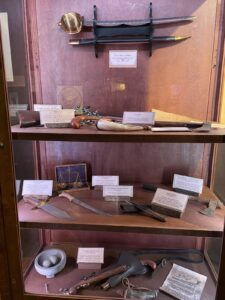






Friday we spent the bulk of the day at the Texas State Aquarium. The HA is an aficionado of fish zoos. The dolphin show was fun. More interesting was going below and watching the trainers work the big gray squeaky toys through their paces. This is the first aquarium I’ve been to that served beer. I took advantage of that amenity and chilled out watching the sharks circle.





Saturday we visited the Corpus Christi Museum of Science and History. Again the HA had a good time. As these things go, the Corpus Christi version is a modest example. But the 16th Century shipwrecks and the Western collections are standouts. We followed that visit with a late lunch at Railroad Seafood Station & Brewing Co. We enjoyed the food. I enjoyed half the taster. The floral take on a Mexican style cerveza was novel and pretty good. The pomegranate sour wasn’t bad. The IPAs? Well, Rome wasn’t built in a day. (And what was I thinking, agreeing to try a Peanut Butter IPA? One can push this willingness to try new things too far.) We ended the day on the beach. Not too shabby.







We’ve got a couple more full days. I believe fireworks are on the agenda tonight out on Padre Island. We can send the year out with a bang. And a linger scent of brimstone. I’m not sure what to make of that. Oh well. Happy New Year to you all. I’ll be editing, as I’ve been doing each day during this trip.

Here’s a suggestion for your resolutions: Read more books by Ken Lizzi. It’s a resolution that’s good for both of us.
December 24, 2023
Kane’s Christmas.
With apologies to Karl Edward Wagner.
The bitter wind snarling and screaming across the slate tiles of the little cottage fit Kane���s bleak mood. Endless shrieking; eternal, pointless motion rushing nowhere. It never ended. He never ended. And here he had arrived at yet another frigid winter, suffering an ennui that might drive him outdoors into the frozen embrace of death if he could summon enough willpower to move from where he sat on his stool by the simple board table, warmly dressed though unarmored, sword slung across his back within reach of his left hand.
Puffs of white smoke roiled past him, driven by what must be a draft from the chimney. Kane coughed, then with a sigh of utter weariness, turned toward the chimney and rose to tend to the fire and see if he could address the draft.
A man stood between Kane and the chimney. A man in many ways a mirror image of Kane: tall, broad and heavily muscled, with heavy, coarse features largely concealed by a beard. There were obvious differences, however. Whereas Kane���s midsection was flat, the man before the chimney carried a rotund paunch, and his beard was white in contrast to Kane���s coppery facial hair. The newcomer wore warm, red clothing lined with white fur, and held what appeared to be a woolen sock dangling in his right hand.
���Been a long time, Kane,��� the man stated in a hearty, garrulous tone.
���Has it?��� queried Kane with seeming indifference.
���A century,��� the other said. With that he unleashed a wicked forehand with the sock. The sock bulged with some heavy burden, and its ponderous arc intersected Kane���s left shoulder with a wallop that staggered Kane and burst the stocking. Dull black lumps of coal in staggering profusion scattered free of the restraining sock and bounced and clattered about the rough wooden boards of the floor, some disappearing through gaps to the frozen ground below.
Kane righted himself. He tried to reach for his sword, but the blow had numbed his shoulder and his left arm refused to answer his command. He growled. ���Fine. Come on, Klaus. I can take you with one hand.���
Klaus stepped forward, beaming his delight. But instead of coming to meet him, Kane dropped to one knee. He tugged at the end of a rope emerging from a gap between floor boards.
From outside, rising above the insistent plaint of the wind, came the snorts and moans of animals in distress. Moving wide to keep the table between himself and Kane, Klaus moved to the door. He tugged it open, letting in a swirling blast of wind that hurled stinging snow crystals about the small, one-room cottage. Visible in the bright moonlight, in the clearing before a stand of dark, looming pines, a string of antlered deer stood, harnessed to a sleigh. It was these animals keening in dismay. They appeared to have dropped a couple of feet into the snow covered earth. The sleigh teetered behind them on the brink of some sort of pit.
���I figured you might come, Klaus. Now get out,��� Kane said, ���or I���ll tug the rope a second time. The second pull triggers the bear traps. I imagine two or three of your pets might avoid the jaws, but the rest will suffer one or more crushed legs. Tough night for you in that case.���
Klaus turned to regard Kane. ���We���ll call it a draw,��� he said at last. ���Until next time, Kane.���
���I���ll leave out a plate of cookies.���
���I won���t eat them, poisoner.���
���Leave, Klaus. By the door this time.���
Klaus emitted a belly laugh, placed one mittened finger beside his nose, and left through the door.
Kane felt some function returning to his shoulder. He closed the door against the brutal elements then returned to his stool where he sat with an unexpected sigh of contentment. Existence felt worth enduring again. A grin softened his grim visage. That old bastard had given him a present after all.
There. That’s my present for you, dear reader. If you’d like to grab a last minute present for someone, may I suggest you shop here?
Merry Christmas.
December 17, 2023
On Stranger Tides: Tim Powers’ Swashbuckling Adventure
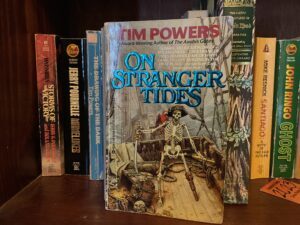
It has been years, decades, since I first read On Stranger Tides. I suppose I have been busy reading other things. It’s a pity those other things couldn’t all have been as fun as this. It���s long for a work of (perhaps) sword and sorcery, 322 pages in my paperback edition. But despite the length it still may well qualify as S&S. Swords it has in plenty: cutlasses, rapiers, sabres (though I note that Powers uses the latter two terms interchangeably.) There is plenty of swashbuckling swordplay, blades clashing aboard ships, on piers, etc. And there is sorcery galore, of the voodoo variety. As usual Powers has worked out a detailed supernatural science and deploys it in great detail. The man works only in big ideas and never disappoints. There is no grand, world-saving quest here. The stakes are personal, the motives of most characters venal. Even many of what might be more noble goals are tarnished by the means and utter lack of scruples employed in pursuing them.
I don���t know, maybe it isn’t S&S. But it is a glorious adventure, sprawling across the entirety of the Caribbean from Haiti to Florida. Set near the tail end of the golden age of piracy, it features notable historic villains such as Blackbeard and Stede Bonnett, with cameos from Anne Bonny and Calico Jack. The Caribbean of Stranger Tides, however, is steeped in dark magic, with pirates employing voodoo as a tool every bit as important as sailing ships and cannons. We get a protagonist caught up in the game, an unwilling pirate at first, whose motivations shift from a mixture of revenge and pecuniary interests to the romantic as he attempts to rescue his love interest from the nefarious clutches of her father, whose obsessive love for his dead wife is a dark mirror of the hero���s.
We get sea battles, zombies, the Fountain of Youth,�� zombie pirates, storms, magical duels. And rum. Plenty of rum. And puppetry. This is an unflinchingly brutal tale, not sparing of spilled gore and viscera. I was pleased, if pleased is the right word, to find that the aspect of the tale that had the power to make me cringe every time it recurred to my memory, still had what it took to make me wince this time through. If you grew up reading history of the Spanish Main and plunder and the skull-and-crossbones flag, and if you are a fan of heroic adventure fiction, On Stranger Tides is the book you need in your life right now.
As a fun coincidence, while I was reading this book, I received an email from the narrator of the upcoming audiobook version of my novel Silver and Bone. Coincidental, I say, because this fourth book of the Semi-Autos and Sorcery series is set in the Gulf of Mexico and deals with pirate treasure and voodoo. That’s about as far as the similarities go. But still. Spooky.
December 10, 2023
Tomball German Christmas Market
Today MBW and the HA and I drove north to Tomball, Texas to spend a few hours wandering about the Tomball German Christmas Market. The town of Tomball celebrates Texas’ German roots and the Christmas season. There were food and drink booths galore, various vendors, wandering street performers, a carnival, multiple venues for live music, and more. MBW and the HA went Mexican for food, choosing churros and street corn. I tried to stay thematic with a bratwurst and sauerkraut. Also, beer, a German dunkel to be precise. And, also on theme, I purchased a Christmas present for MBW. I’m afraid there will be no surprise factor, but at least I know that when she unwraps it she’ll be happy with the gift.
The HA enjoyed a couple of carnival rides. We browsed through a couple of the labyrinthine antique stores that anchor the festival street. And we met up with some friends. Happily for my aching feet, we spent the last hour or so sitting at a table in Fire Ant Brewpub.
I feel warmed up for the Christmas season now. If you are feeling festive and beginning to consider the purchase of gifts, allow me to mention that books are an ideal choice. Consider shopping Amazon or Barnes and Noble.
And now, pictures.









December 3, 2023
Jack Vance’s Maske: Thaery. Plus Beer Tasting Notes.

I can conceive of no reason not to accompany a review of Maske: Thaery, by the sui generis literary genius Jack Vance, with a review of a few brews. And I might as well do it while watching a football game. If that seems an unexpected, odd, and yet ultimately compelling combination, welcome to the Jack Vance appreciation society. And yes, this is being written before the posting date.
There is no doubting that one is reading a Jack Vance novel. His style is unmistakable. It remains consistent across all genres he played with, and still becomes both his fantasy and his science-fiction: urbane, quirky, mannered, understated, filled with imaginative detail, and language that appears at once esoteric, archaic, and otherworldly. His use of color is nonpareil, his bon mots on par with Oscar Wilde.
Tinsel Trousers. Eureka Heights. Spiced Golden Ale. 7.5%. Pours deep gold, almost amber. Pleasantly spiced. The kind of liquid Christmas cookie I���d want after clambering down yet another chimney to lavish undeserved presents on another entitled brat. Could use a bigger nose; the aroma does not clue you in to the flavor.
Maske: Thaery is one of Vance���s distant future science-fiction novels, like his Alastor or Demon Princes books. The protagonist should be familiar to the Vance reader: prideful, quick-witted, resourceful, bold, and egocentric. There is always a refreshing touch of the picaresque about a Vance hero.
The story occurs primarily on a planet dominated by a religious group (and a couple of schismatic/splinter factions.) They represent a second, much later colonization. The religion values the status quo and despises technological innovation and outside influences. A few hundred years have passed since, along with certain social changes. Vance does his usual fantastic job of depicting unique societies (the colonists, splinter groups, and the older, prior human colonists) and their distinctive laws, customs, attire, etc. And he throws in, mid-way through the book, a second planet, replete with an entirely different society, etc. At this point the man was just showing off.
Christmas Ale. Bells. Scotch Ale. 7.5% Pours a dark caramel. No nose to speak of. Bland. A coal in your stocking.
The hero, a second son, seeks employment in the big city. With a letter of introduction from his uncle (in a bit that erroneously made me think we might be getting into Three Musketeers territory) he finds employment with an organization that turns out to be an intelligence service. Various early events coalesce. We get a properly villainous villain (who is in some distant way a mirror of the hero), secondary villains, a far from straightforward romance (nebulous and unresolved), action, deceit, battles, a sea voyage, intrigue, considerations of the impact of tourism, and much more.
Excessive stress. But that���s merely due to the football game. I will eschew externalities. Instead, I will drink beer, thus controlling internality.
Coffee Porter. Real Ale Brewing. 6.6%. Pours a creamy head, motor oil dark. Latte, vanilla porter nose. Taste fulfills the promise of the aroma. I wish I had a tub of vanilla ice cream with which to make a float.
The odd, fantastic events near the end are, to an extent, adumbrated at earlier stages of the narrative. Still, aspects of the culmination seem out of place, as if imported from another narrative. The anticipated showdown does not materialize in the conventional sense. As a writer that is refreshing. As a reader I found it somewhat disconcerting. Nonetheless, up to that point ��� and even to an extent through and beyond that point ��� I was content. And the denouement, well, that almost made up for it. I laughed, and I don���t ascribe that response to the beer. That final bit of misdirection might have been the impetus for the whole book. I can imagine some bar room banter suggesting it..
Harmony. Saint Arnold Hazy IPA. 6.5%. Pours a straw gold, without a great deal of haze. Texas is not, after all, the Northeast. Still, it is a mild IPA, geared for the palettes of those who pucker at hop bitterness. Not bad.
Tight football game. A real nail biter. This is the sort of drama that you cannot script. Or, well, you can, but cannot impose it upon reality. I need a drink. Maybe two.
If you���d like something to read to accompany a beer or two, may I suggest something of mine? Pour a cold one and read Thick As Thieves. Or perhaps you would like to pass the morning with a Bloody Mary and Reunion. I have plenty of options for you. Cheers.
November 26, 2023
Death Angel’s Shadow. A Terrific Trio of Tales from Karl Edward Wagner.
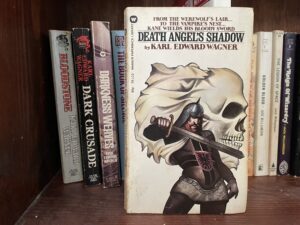
Karl Edward Wagner created a truly unique character in Kane. Yes, that Cain (maybe, more or less, perhaps in a different world.) Death Angel’s Shadow collects three Kane novellas/stories.
Reflections for the Winter of My Soul is an excellent werewolf story. It is a massacre in an isolated chateau. It should be filmed by Neil Marshall as a sort of companion piece to Dog Solders. Being a Kane tale it is bloody, horrific, tragic, and even at times poignant.
Cold Light is a men on a mission story. Nine adventurers, each with a unique personality and background, are on a quest to hunt down Kane. It is a sort of Bizarro World Predator, with Kane cast in the eponymous role. It is solid adventure fare that ends on an ambiguous note. Whether the end is tragic or — uncharacteristically for a Kane yarn — hopeful, we don’t know.
Mirage. What happens when a vampire attempts to turn an immortal being into one of the undead? KEW shows us. Mirage is atmospheric, a sort of psychedelic evocation of Bram Stoker.
The Kane books and stories are a reminder of the shared heritage of Sword-and-Sorcery and Horror fiction. Wagner was masterful at both and with Kane skillfully weaves in whatever aspects he needs to tell the story. And with Kane, Wagner could remove any governor of ethics, morality, or heroism. Kane is a Luciferian character. Not in the sense of being diabolic, but in the “Better to reign in Hell than serve in Heaven” sense. He is utterly self-centered and amoral. He does not actively seek to do evil from some inner malevolence, he merely does not care if evil results from his actions or if evil effects are necessarily attendant to the pursuit of his goals. Inevitably carnage follows wherever Kane goes.
Before you go, why not pick up a copy of Thick As Thieves? Read it yourself, then use it as a Christmas present for one of your friends or relatives with a taste for S&S/crime fiction.



